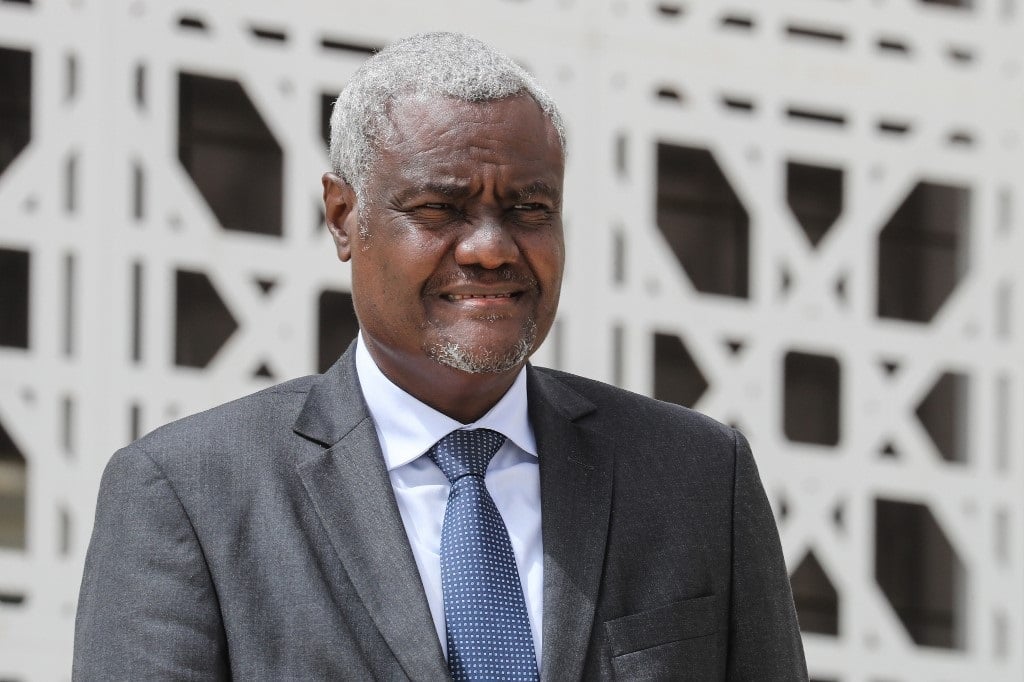
Moussa Faki Mahamat, Chairman of the AU Commission;
- As Africa faces a series of crises, African leaders are called upon to rise to the challenge of the continent.
- AU Commission Chair Moussa Faki Mahamat criticized African leaders for failing to address growing challenges through governance.
- Fakih painted a “bleak picture” of current events on the continent, citing examples from countries such as Sudan and Senegal.
African leaders were called on Saturday to step up efforts to tackle the myriad conflicts and political crises ravaging the continent of 1.4 billion people.
Opening the two-day African Union summit, AU Commission President Moussa Faki Mahamat painted a “bleak picture” of the “continued challenges” facing many countries.
Faki slammed the failure to counter multiple “unconstitutional changes of government” following a series of coups in West Africa, saying the scourge of “terrorism” has diverted funds from vital social needs to military spending. warned that it was being done.
Faki said Sudan was “hurt, torn and thrown into chaos”, while Libya was fragmented and open to external interference and the Sahel faced a dangerous vacuum.
He said central Africa's Great Lakes region was witnessing a worsening of the “permanent crisis” caused by the conflict in eastern Democratic Republic of the Congo.
“Africa cannot afford not to join arms and work to promote real peace in the region,” Faki added.
A mini-summit to consider how to restart the DRC peace process, attended by the Congolese leader and his Rwandan rivals, opened on Friday on the sidelines of a major AU meeting and was scheduled to continue on Saturday.
Gabon and Niger were absent from the summit after being suspended following last year's coup, and Mali, Guinea, Sudan and Burkina Faso were also refused participation for similar reasons.
But the 55-nation bloc has long been criticized for being powerless and rarely taking decisive action in the face of numerous conflicts and power grabs.
Faki expressed concern about the crisis in Senegal caused by President Macky Sall's last-minute move to postpone this month's elections in the country, usually seen as a beacon of democracy in West Africa.
But he said he hoped for a “spirit of consensus” to organize “inclusive, free and transparent elections as soon as possible” after the Constitutional Council rejected Sall's motion.
Faki also cited “worrying trends” in the Horn of Africa. Tensions flared in the Horn of Africa after African Union host Ethiopia struck a deal with the breakaway region of Somaliland giving it long-sought sea access, infuriating Somalia. It's increasing.
“Our main challenges have not diminished in importance,” Faki said, including political instability, climate change, poverty, “deficiencies” in economic governance, and the marginalization of women and youth in development and leadership. It pointed out.
Read | Senegal's president promises to hold elections 'as soon as possible'
Nina Willen, Africa program director at Brussels think tank Egmont Royal Institute of International Relations, said ahead of the summit that she did not expect a strong decision by the AU.
The commission so far has had “little influence in countries hit by recent coups,” he said, as member states do not want to set a precedent that could conflict with their own interests. he added.
Outside Africa, the conflict between Israel and Hamas in the Gaza Strip was a hot topic, with Palestinian Prime Minister Mohammad Shtayyeh among the participants from outside the region.
By easing tensions over the one-year rotating AU presidency handed over from Comoros President Azali Assoumani to Mauritanian President Mohamed Ould Ghazouani on Saturday, the EU could avert a crisis on other fronts. did it.
A successor has long been hampered by the conflict between Morocco and Algeria, highlighting divisions within the AU even as it seeks a stronger voice on the world stage, including in the G20 group, which it joined in September. It has become.
There are 19 presidential or general elections scheduled on the continent this year, which portends further challenges.
Also read | AU fully supports SA approach to Gaza conflict – Chairman Moussa Faki Mahamat
“The AU has ambitious institutional initiatives and tools for mediation and peacekeeping, but it lacks the political and financial strength to make full use of them,” the International Crisis Group said in a briefing statement. ” he said.
“Rather than investing in collective security, member states are looking inward and fiercely guarding their sovereign prerogatives.”
Another key topic at the summit is expected to be how the AU will transition to relying on African countries rather than foreign donors for the bulk of its budget.
In December, the UN Security Council adopted a resolution to fund AU-led peace missions, but capped the budget at 75%.

